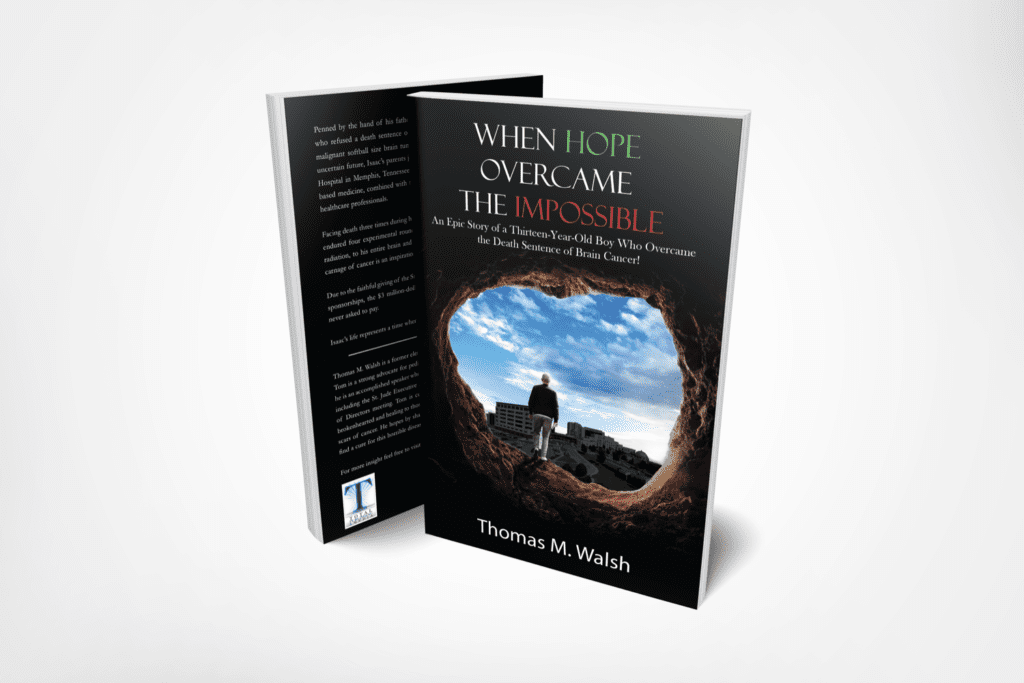“The surgeon’s words rang hollow as if I were in a dream…he told me to prepare for [my son’s] passing, as it was expected he would die of a stroke and/or heart attack on the operating table.”
In some ways, Tom Walsh’s book about his 13-year old son Isaac’s life-threatening battle with brain cancer is a compendium of life lessons one never wants to learn. The reader is fortunate, then, to have found this roller-coaster-ride of a book, for it is full of lessons usually only learned firsthand, the hard way. The reader is furthermore fortunate to have found such a well-written, heartrending book written by local, retired elementary school principal Tom Walsh because it is a clear, concise account of a family’s struggle with this terrible disease and the way it affects the lives of all it touches.
In March of 2011, Isaac, a healthy, athletic, 7th grade boy, son of Tom and Dacia, brother of Caleb, played his last basketball game. “Usually overjoyed at his chance to play,” that night he was lethargic, listless, short of breath, and suffered from a headache and pain in his legs. On the way home, his eyesight became so blurry he “could not read the signs by the side of the road.” A few days later, he fainted at school.
Weeks later, as the father watched his son make his way “gingerly” from the car into school for what would be his last day for months, knowing that Isaac “had lost thirty pounds, or nearly twenty-five percent of his body weight,” Tom observed that he appeared “ghostly white in color…ghastly.”
An hour later, Isaac’s parents, in “anguish and pain, deeply alarmed and concerned,” admitted him to St. Francis Children’s Hospital in Tulsa for a CT scan of his brain and spine. Soon they would hear the first of many hellish diagnoses with little hope of an outcome that wasn’t tragic. The doctor explained that the scan had revealed a malignant, cancerous, softball-sized tumor on his brain stem. Another first of many came when they set aside their own fear and grief to ask each other, “What do we tell Isaac? What do we say to our son?”
Their son “perceived something was wrong,” though they had given him little detail, and asked them to hold his hand, as he was afraid of what might come next. Then he asked them “if he was going to die.”
Though he wasn’t expected to live through the immediate emergency surgery he underwent to drill a hole through his skull into his brain to alleviate the pressure the tumor was causing, he remained stable throughout the procedure and lived to endure twenty-one more surgeries, four experimental rounds of chemotherapy, and thirty-one radiation treatments, and faced death’s door three times.
In a fortunate turn of events, Tom and Dacia learned that a “research scientist from St. Jude Children’s Research Hospital [in Memphis, Tennessee] had called after reviewing Isaac’s diagnosis” on the “cancer registry database at the CDC.” Isaac “met the criteria for a pediatric clinical trial” there, so soon after, the Walsh family, without eleven-year old Caleb, who had to stay behind with dear family friends in Sapulpa, “headed east” on a “lonely journey” to a city where they didn’t know a soul. However, Walsh writes, that changed as soon as they “walked through the gates of St. Jude,” where they met indispensable friends, doctors, nurses, and fellow cancer-stricken families.
Knowing the end of the story, that Isaac survived his nearly-fatal bout with cancer and is now a healthy, happy, cancer-free man of 23, did not prevent me from feeling immense sorrow or tears coming to my eyes as I read his father’s words of anguish and uncertainty. Those of us left untouched by this kind of tragedy are able to stay blissfully ignorant of the physical pain, emotional agony, fear, and lasting trauma that grips so many families facing terminal illness every day.
When speaking with Walsh face-to-face, the utter relief, joy, and gratitude he feels for his son’s recovery and multiple chances at life is palpable. Like most people who have been forced to grapple with the possibility of the death of a loved one, he radiates an appreciation and freedom atypical of the average world citizen. His love and respect for the multitude of doctors, friends new and old, church members, and colleagues, essentially the proverbial “village” that helped Isaac and their family win this war, is evident. His love for Isaac and the entire family’s protectiveness of each other during this time is vivid and beautiful.
It is difficult not to feel uplifted when talking to Tom Walsh. This is a man who glimpsed the abyss and has come back to teach the rest of us. Isaac’s medical ordeal may be over, but the Walsh family’s mission to educate others about the benefits, blessings, and life-saving work of St. Jude and to be a soothing and comforting source of hope for those who do understand this journey, is making its written debut with this wonderful, heart-wrenching book.
One of the primary messages of the book is the unwavering, unconditional love the Walshes have for Isaac and Caleb, and the resilience, strength, and determination the boys displayed in different ways during their own difficult, individual journeys.
Further, Isaac’s defeat of the disease that tried to take his life so many times, taught the family that, in Caleb’s words, “nothing is impossible.” Tom made a vow that he would never allow himself to “look back and wonder what could have been…rather, our family would chart a new course appreciating each member as we enjoy our short time on Earth together.”
As for the survivor, Isaac, he has had to learn another hard lesson—that “picking up the pieces of a broken life is almost as difficult as the treatment itself.” He says he “would like to tell those who have cancer that going back into the real world will be the hardest thing you do…you must own yourself!” He says the experience forced him to learn the most important of life’s lessons, unusual for someone so young. “I know my life is short, I gotta live life to the fullest, and I don’t take life too seriously because I will die someday.” Yet, despite it all, he says, “it’s almost like I’m more alive now than I was before I had cancer.”
When Hope Overcame the Impossible—An inspirational true story of a 13-year-old child’s battle to overcome the carnage of brain cancer was released on the Amazon and Barnes & Noble websites in the beginning of the month. To order your copy, please visit one of those sites, or to order a signed copy and for more information on the Walsh family’s life-changing journey, please visit www.thomasmwalsh.com. Sapulpa Times will notify readers of the dates, times, and locations of Walsh’s upcoming book signing events.










